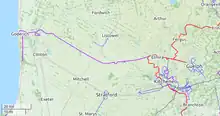Guelph and Goderich Railway
The Guelph and Goderich Railway was a railway in southern Ontario, Canada. It came about from a desire for a connection from Guelph to the harbour at Goderich on Lake Huron.
.jpg.webp)
History
The city of Guelph owned the Guelph Junction Railway (GJR, incorporated in 1884 and owned by a consortium of merchants and the City of Guelph) to connect to the Canadian Pacific Railway (CPR) mainline 15 miles south of town in Campbellville. This line was completed in 1888 and by May 1887 had been leased to the CPR.[1] The railway's charter was amended in 1886 to allow construction of a line to Goderich which was delayed for several years. Eventually, the city of Guelph applied pressure on the CPR to get the line built.[2]
The CPR had finished three surveys for the Goderich line by December 1903; the first via Linwood, Atwood, Brussels and Listowel; the second via Conestogo, Linwood, Atwood, Brussels; and the third via Seaforth and Clinton. Growing frustrated, the GJR announced in 1904 they would petition Parliament seeking a charter to incorporate the Goderich & Guelph Railway, between both namesake cities with branches to Listowel, St. Marys, Stratford and Clinton.
The CPR finally agreed to build the line to Goderich from Guelph and construction began in 1904. The line was laid with 80-pound-per-yard (40 kg/m) rail and reached Goderich in 1907. There was also a 16-mile (26 km) branch line from Linwood to Listowel. Envisioned branches to Stratford and St. Marys were never built. The principal stations were located in Guelph, Elmira, Linwood, Milverton, Monkton, Walton, Blyth and Goderich.[3] On October 6, 1904 the G&G was leased to the CPR for 999 years, with the City of Guelph obtaining a prohibition against diverting G&G traffic off the Guelph Junction Railway line.[4]
G2G Rail Trail

The 127-km line between Guelph and Goderich was abandoned by the CPR in 1988. The Province of Ontario purchased the land shortly thereafter with the intention of protecting an infrastructure corridor. The original plan was to build a water supply pipeline from Lake Huron to Guelph. As a result of amendments to the Great Lakes Water Quality Agreement (GLWQA), before construction could begin, this usage was prohibited. The corridor was retained for future use and designated an interim use for non-motorized recreation. Various organizations such as the Maitland Trail Association and Kissing Bridge Trail Association have subsequently leased portions of the land from the province. Over the next 20 years, upkeep varied from total neglect to carefully maintained as narrated in Lynda Wilson's vivid descriptions while walking the full trail in 2015.[5]
Connecting portions have been opened as the G2G Rail Trail, a recreational trail for use by walkers, hikers and bikers.[6] G2G Rail Trail Inc. is a non-profit charitable organization.
In the summer of 2020 a team of students and local volunteers completed a total refurbishment from end to end which included brush clearing, grading and surfacing with stone dust.
See also
References
- "About the GHRA". The Guelph Historical Railway Association. The Guelph Historical Railway Association. Retrieved 27 December 2015.
- "Canadian Pacific Railway - London Division Branch Lines". Old Time Trains. Old Time Trains. 2015. Retrieved 27 December 2015.
- "The Guelph & Goderich Railway". Train Web. Train Web. 31 December 1997. Retrieved 27 December 2015.
- Kennedy, R. L. (2009). "Canadian Pacific Railway London Division Branch Lines". Old Time Trains. Retrieved September 15, 2015.
- "Walking Home". Lynda Wilson. 2015. Retrieved September 15, 2020.
- "G2G Rail Trail". G2G Rail Trail. 2020. Retrieved September 15, 2020.